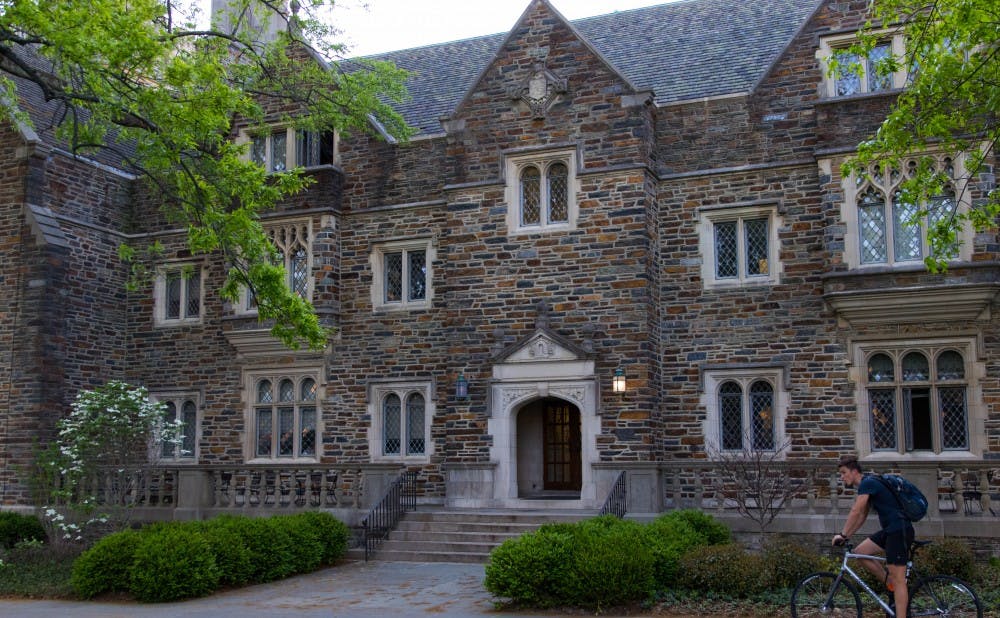Arts & Sciences Council approved a new writing and rhetoric minor from the Thompson Writing Program and further discussed the proposed draft for the new Trinity College curriculum during its Thursday meeting.
In a 26-1 vote, council members approved the writing and rhetoric minor, which aims to “cultivate understanding of and practice in the complexities of written, verbal and digital communication across contexts” as the first minor under the TWP.
Discussion of the Trinity College curriculum proposal
The Council presented input from Trinity College departments on the offering of century courses and other curriculum changes. Century courses would allow students to fulfill a distribution requirement with one class instead of two.
“If you could only take one course in [TOPIC] in your life, this is the course our faculty would
want you to take,” the curriculum proposal reads.
The century course proposal drew mixed reactions from the council members.
Yue Jiang, assistant professor of the practice of statistical science, expressed concerns about the ability of one century course to properly fulfill the requirements of two courses and the possibilities of a student going through the program “taken less than they otherwise would have.”
The math department also shared concerns about the introduction of century courses.
“We were worried about, especially in math, [given] the varied backgrounds that we see of students coming in, what kind of course we could create if it was just kind of a free-for-all for anybody,” said Sarah Schott, associate professor of the practice of mathematics.
Associate Professor of Physics Phillip Barbeau described century courses as a mixed bag, sharing that some faculty members were interested in teaching the courses while others worried about teaching century courses without prerequisites.
Some departments favored the century course proposal. Owen Astrachan, professor of the practice of computer science, expressed excitement surrounding the change.
“The only topic of conversation we had in that [computer science department] meeting was really about century courses, and that was more excitement of ‘what could we do?’” he said. Astrachan elaborated that the department was on board with the change, especially concerning the elimination of curriculum “gamification.”
Council members also weighed in on changes to language and writing requirements. Representatives from the language departments approved of the increase from one minimum language credit to a minimum of two.
Professor of Classical Studies Micaela Janan expressed her department’s enthusiasm with the minor expansion, describing language as a “window into cultural values.”
Kata Gellen, associate professor of German studies, echoed Janan’s sentiments, especially given the increasing number of students enrolling in higher-level German courses.
Some faculty members wondered about the implications of changing from a foreign language requirement and a writing requirement to a language and writing requirement under the proposed curriculum.
Heekyoung Hahn, associate research professor of mathematics, clarified the distinction.
“Many [Duke] students are coming from a very multilingual background … we are acknowledging that, and also [that] many students will greatly benefit [from] working on their existing linguistic knowledge,” Hahn said.
Additional feedback
Council members also described other elements they felt were missing from the proposal.
Marc Brettler, Bernic and Morton Lerner distinguished professor in Judaic studies, mentioned that the role of religion felt neglected in curriculum descriptions of certain academic areas.
Associate Professor of History Gunther Peck added that the current proposal has a “profound absence” of courses covering systemic racism, especially in light of a University-wide commitment to anti-racism announced by President Vincent Price in 2020.
The Council also addressed themes of equity. Schott noted how additional credits required within the proposed curriculum could disadvantage students who had fewer classes to explore in high school.
Other speakers emphasized the challenges faced by smaller humanities departments to engage with the first-year experience as intended in the proposal.
“We just don’t have the resources for it, and so I’m worried about how [we are] going to get really involved in, for example, the first-year experience, if we’re just sort of spread thin and doing a lot of other stuff,” Gellen said.
Get The Chronicle straight to your inbox
Signup for our weekly newsletter. Cancel at any time.
Ryan Kilgallen is a Trinity first-year and a staff reporter for the news department.

